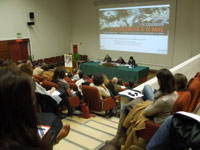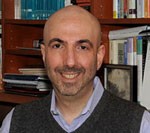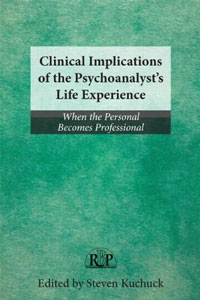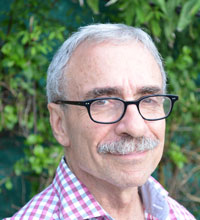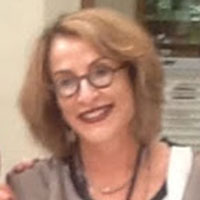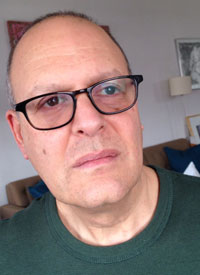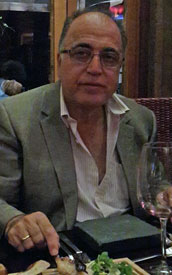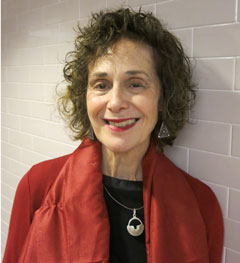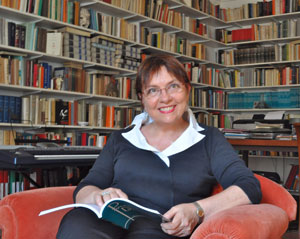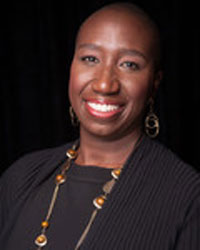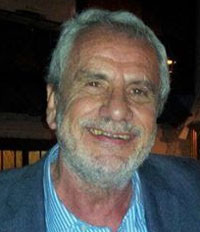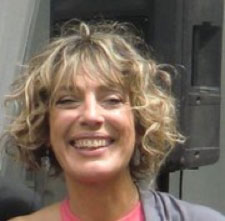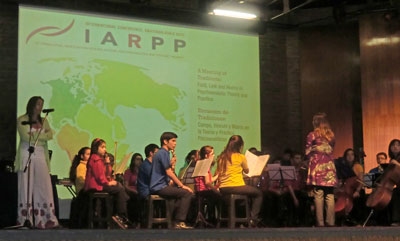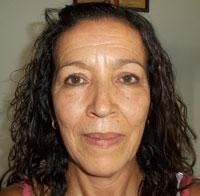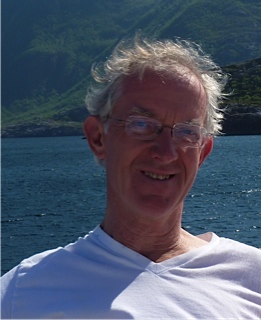and News from other IARPP Chapters:
Israel
Greece
Mexico
New Zealand
Portugal
United Kingdom
Mexico Chapter
by Alejandra Plaza Espinosa
aplazaespinosa@yahoo.com
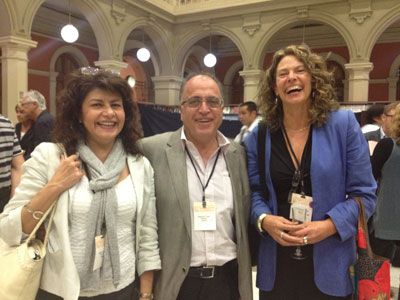
Alejandra Plaza Espinosa, co-Chair, Alejandro Ávila Espada, Anne Marie Maxwell, co-Chair
We are a group of therapists from different associations and different ways of thinking, but we all agree in the relational approach as a way of working and understanding life.
We are starting with 20 members and we are 6 in the main planning group, which consists in:
Alejandra Plaza, José Ángel Aguilar, Anne Marie Maxwell, Adriana Dávila, Patricia Minjares, Lucía Chávez.
We are very enthusiastic to create a platform for the dissemination of Relational Psychoanalysis and to consolidate an academic group with our own identity.
During 2013 we organized a course of Relational Psychoanalysis that had two parts: A series of 6 Videoconferences. The speakers were Alejandro Ávila, Joan Coderch, Carlos Rodríguez Sutil, Ariel Liberman and Margaret Crastnopol. The other part of the course consisted of a Study Group that discussed the topics presented by the experts.
The videoconferences gave us the opportunity to discuss, analyze and reflect about theoretical and clinical topics with psychoanalysts that are very far from Mexico and that have a lot of experience and knowledge. We have read papers by these authors and, by this means, we have had feedback about our reflections. It was very motivating to realize that are different points of view, within the relational approach.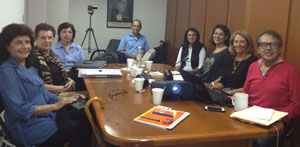 We had the chance to share our thoughts with authors from a new generation that are creating a new psychoanalytical frame. It was a great experience to meet people who have the courage to question classical psychoanalysis.
We had the chance to share our thoughts with authors from a new generation that are creating a new psychoanalytical frame. It was a great experience to meet people who have the courage to question classical psychoanalysis.
For 2014 we plan to continue with the videoconferences and the Study Group. We are going to organize a program of film discussion, with the aim of spreading our activities to the public interested in these topics.
We are building a website, where people can be in contact with us to learn about our events, and where we can post our papers, conferences, presentations. We already have a Facebook page, that is less formal, the address is https://www.facebook.com/AmigosRelacionales?ref=profile.
We are going to organize a National Conference, to present papers from Mexican Psychoanalysts. We know that it’s a very big responsibility and commitment, but our motivation is as big as the challenges.
We want to thank Chana and Neil for their kindness and support, and we are especially grateful with Alejandro Ávila for his encouragement and friendly advice.

ISRAEL CHAPTER REPORT
by Sharon Ziv Beiman
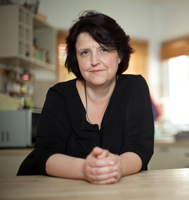
- Sharon Ziv Beiman
In the last issue of IARPP eNews, we shared with you the strong impact of the conference Individuals and Groups – Mutual Vulnerability: A Unique International Conference
with Professor Lew Aron that took place on July 4th and 5th 2013 IN Tel Aviv.
During the seven months that passed from July, the Israeli chapter of IARPP organized and operated the following events:
A clinical meeting centered around the relational aspects of art therapy as seen in the therapy of an 8 years old boy – case presenter: Yoni Schur, discussant: Ester Bamberger, chair: Tamar Barnea.
A seminar called, “Face to Face-couple-relations and Couple Therapy from Relational Perspectives: Theory and Clinical Demonstrations” – presenters: Irit Kliener-Paz and Orna Schur
An evening with Joyce Slochower moderated by Mitchel Becker in which she presented her paper “Witnessing and Participating: Sexual Boundary Violations and the Psychoanalytic Community”
A one day conference organized in cooperation with the Israeli Association for Family and Couple Therapy: “Contributions and Innovations of the Relational Approach to Family and Couple Therapy” – Presenters: Irit Kliener –Paz, Orna Schur, Sharon Ziv Beiman, Aviva Mazor and Elinor-Gurion-Bashan.
On March 6th-7th 2014 our annual conference, “Relational Circles 2014” will take place. The vision of the conference is to create the space needed for co-learning, developing and exploring relational ideas as they relate to theory and practice. Twenty-one workshops and 16 original papers will allow the participants to intimately investigate ,experience and discuss relational concepts concerning : trauma, dissociation, gender and sexuality, cultural contexts and the therapeutic arena, ethics and psychoanalytic process, therapeutic stories, self-disclosure as manifestation of the therapist’s subjectivity, spontaneity and rituals in the psychoanalytic process, supervision as dreaming, therapeutic narratives from relational perspectives, the influence of therapeutic processes on the therapist’s personal life, relational aspects of couple-relations on individual and couple therapy, the relational body of the therapist, femininity and masculinity and their inter-relations, relational oriented supervision groups, implementing playback theatre techniques into relational therapy, the “dance” of patient’s and therapist’s relational patterns in psychotherapy, learning and reflecting group on treating parents, and more. An estimated 400 participants will take part in the conference.
In May 2014:
Together with “Amcha” ( An Israeli mental health-care organization for Holocaust survivors and their families) we will host Ghislaine Boulanger who will discuss, together with Irit Kliener-Paz, a case presented by Offer Dubretzky – the chief psychologist of “Amcha”.
We will be hosting Steven Kuchuck who will participate in 2 events:
1) Together with the Tel Aviv Institute for Contemporary Psychoanalysis, a half day conference to celebrate the publication of the book he edited: Clinical Implications of the Psychoanalyst’s Life Experience: When the Personal Becomes Professional. We will focus on Chana Ullman’s chapter:
“The personal is political, the political is personal: On the subjectivity of an Israeli psychoanalyst
2)Together with the Gay-Friendly Psychotherapy Group, an evening to discuss Steve’s paper The Therapeutic Action of Male Sexual Desire in the Treatment of Heterosexual Men
Most importantly, on October 2013 the forum had a special meeting dedicated to re-evaluating the Forum’s vision and goals. The essence of the discussion centered on the tension between those who wish the forum would invest in deepening and expanding the conceptualization of relational thought in the field of psychoanalysis and those who wish to promote the integration of the relational thought with other therapeutic schools or its assimilation and implementation in a variety of contexts. There was an agreement that the mission is to maintain the dialectical tension between these two visions.
We look forward to continued sharing of our activities with you.
On Behalf of the Israeli Forum for Relational Psychoanalysis and Psychotherapy,
Sharon Ziv Beiman

United Kingdom Chapter
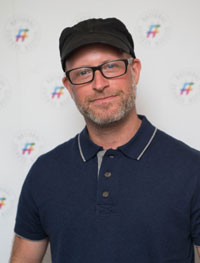 by Aaron Balick
by Aaron Balick
This year has seen some big changes in the UK chapter of IARPP. Most notably, our Chair, Susie Orbach has decided to step down after more than a decade of service. Joining her, founding and executive member Jane Haberlin has also stepped down. Both Susie and Jane carry a great deal of history for relational thinking in the UK, having both been members of the original relational study group that later developed into IARPP UK and The Relational School (TRS), which is the organisation responsible for our relational community and events. Their departure was announced at our annual general meeting in December, where Aaron Balick (who previously served as vice chair) was appointed Chair and Marsha Nodelman (also a member of the original grouping) was appointed vice chair. Susie and Jane will be greatly missed.
Both Susie and Jane, among others, were responsible for the founding event in 2002 “What is Relational Psychoanalysis” — a “teach-in” that garnered a great deal of enthusiasm for relational thinking here in the UK and instigated IARPP UK and TRS. A lot has changed in the UK since that event, with relational thinking now a staple of many psychotherapy trainings throughout the country. The remaining executive committee is now meeting regularly to discuss the next steps for IARPP UK and TRS in this context.
We are currently engaged in other groupings with a relational interest and are exploring creative alliances with them. We made a start by co-organising with the International Association of Relational Transactional Analysis (IARTA), an intimate discussion at at The Freud Museum with Lewis Aron on the limits of relationality; we are having a follow up meeting with them to see where else we can build bridges. In an effort to exploit the talents and experience of our membership, we had a presentation from Robert Downes on photography and relationality which was followed by a very engaging discussion. This year also saw the publication of Aaron Balick’s relationally inspired book, The Psychodynamics of Social Networking: Connected-up Instantaneous Culture and The Self for which there was a launch event followed a few days later by a discussion with Susie Orbach at The Freud Museum London.
Our next event in March, “Meeting What Can’t Be Met” will look at the limits of working relationally with regard to situations where therapists may feel impotent in relation to their patients’ despair. Following this we will have a members’ forum to discuss new directions for The Relational School which will include relationships with other UK organisations interested in relational thinking, and developing our discussion list and website. We hope to use technology to enable greater community relating within the membership including members’ events, study and supervision groups. We very much hope to build upon our very engaged community of relational thinkers and clinicians.

News from the New Zealand Chapter
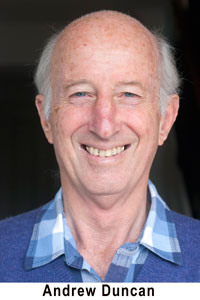
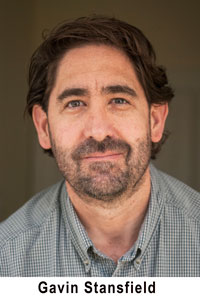
Since you last heard from us, we are pleased to say that we held a successful weekend Symposium – called “Thinking Clinically” – in Auckland last September.
Numbers at this fully subscribed event were limited to sixty, so that everyone could participate in the rich group conversations that followed each keynote presentation and the accompanying response from a discussant.
Auckland psychotherapist, Bill Farrell used a captivating description of Alfred Hitchcock’s ‘Vertigo’ to illustrate how the work of Bion and Matte-Blanco informs his understanding of the unconscious and shapes his clinical work. Marianne Quinn, from Dunedin, generously shared some deeply affecting personal experiences about having the limits of her ‘therapeutic hospitality’ transgressed. Suzanne Johnson, a psychotherapist from Wellington, challenged our traditional thinking about gender in clinical practice and described the kind of non-judgmental, containing, ‘identity space’ she cultivates in her work. In the fourth session, Louise de Lambert (ably assisted by Jennifer Howarth) introduced, and then bravely undertook, a live demonstration of group work based on the method developed by Michael Balint.
People who attended have said they enjoyed and appreciated the space to think together as a group, as well as gaining much from the individual presentations.
We plan to run another symposium, along similar lines, in August this year. We’re excited that an overseas speaker who is well known within IARPP may join us this time.
Please contact either of us if you are interested in the Symposium or in making contact with our local New Zealand chapter of IARPP.
 Portugal Chapter
Portugal Chapter
IARPP’s Portuguese Chapter is, after only two years of existence, an essential reference in the field of psychoanalytic thought in Portugal. This was shown recently by the great flow of audiences at IARPP’s open events and in the manifested interest in the training in psychoanalytic psychotherapy that IARPP-P promotes through its partner APPSI.
This is greatly due to the intense activity developed by the relational group: in the last few months we launched a new website – www.psi-relacional.pt– which has proven essential in improving our envolvement with the psi community, as well as in promoting our events to new audiences.
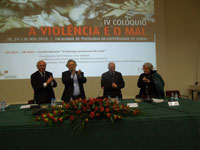 At the end of November we organized the conference “Violence and Evil”, in collaboration with the Faculty of Psychology of the University of Lisbon. In the words of Professor Frederico Pereira, it was “a serious, demanding, rigorous and enjoyable event, where the analytic “thing” was in dialogue with all other areas of thought”. The structure, processes and expressions of Violence and Evil were thoroughly discussed. In addition to having a top panel of speakers, with Eduardo Lourenço (Philosophy), Nuno Miguel Proença (Philosophy), Miguel Esteves Cardoso (Political Science), Adriano Moreira (Political Science), Sérgio Niza (Pedogogy) and Frei Bento Domingues (Theology), we also had the presence of Neil Altman and a large contribution from several Portuguese relational psychoanalysts and psychotherapists, such as Frederico Pereira, Manuel Matos, Maria José Vidigal, Miguel Moita, David Figueirôa, Madalena Paiva Gomes and Filipe Baptista-Bastos. At the end of the third day we counted more than 170 attendants and several – and emotional – standing ovations.
At the end of November we organized the conference “Violence and Evil”, in collaboration with the Faculty of Psychology of the University of Lisbon. In the words of Professor Frederico Pereira, it was “a serious, demanding, rigorous and enjoyable event, where the analytic “thing” was in dialogue with all other areas of thought”. The structure, processes and expressions of Violence and Evil were thoroughly discussed. In addition to having a top panel of speakers, with Eduardo Lourenço (Philosophy), Nuno Miguel Proença (Philosophy), Miguel Esteves Cardoso (Political Science), Adriano Moreira (Political Science), Sérgio Niza (Pedogogy) and Frei Bento Domingues (Theology), we also had the presence of Neil Altman and a large contribution from several Portuguese relational psychoanalysts and psychotherapists, such as Frederico Pereira, Manuel Matos, Maria José Vidigal, Miguel Moita, David Figueirôa, Madalena Paiva Gomes and Filipe Baptista-Bastos. At the end of the third day we counted more than 170 attendants and several – and emotional – standing ovations.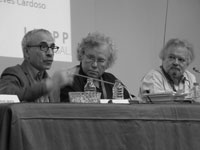
First Iberian Congress of Relational Psychoanalysis. We are preparing the First Iberian Congress of Relational Psychoanalysis, which will take place on the 9th and 10th of May and which is a result of a close partnership that has been gainning strenth between IARPP-Portugal and IARPP-España. The Congress will take place in the beautiful and medieval city of Cáceres, Spain, on the subject of TRANFORMATIONS SPACES. The presence of Michael Eigen, Alejandro Ávila Espada, Frederico Pereira, Manuel Matos, Joan Cordech, Juan José Martínez Ibáñez, Ramon Riera i Alibés, Carlos Rodríguez Sutil, Rosa velasco Fraile have already been confirmed.
We would like to invite all members of IARPP International to come to our Congress. To get to know the program and other general informations you can explore IARPP-Portugal and IARPP-España’s websites.
Guilt. We will be hosting our Annual Congress on the 30th and 31st of October and on the 1st of November. The theme for this year will be GUILT. We will be opening a call for papers soon.
Training. The Relational Training Program developed by IARPP for APPSI has just started a new four-year cycle, having APPSI just accepted a new class in January 2014. The number of students whose main training in psychotherapy will be one of a relational orientation is now of 66 in total, which raises high hopes for us on the de-dogmatization of the analytic space in Portugal.
It has been with great pleasure that we have witnessed and encouraged the formation of work groups proposed directly by the trainees. We have a group dedicated to Film and Psychoanalysis that is now on it’s third Annual Cycle and that has been attended by more than 150 people; also a new work on Violence and Relational Ethics was formed this month.
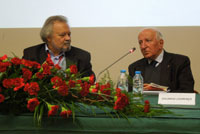 The Center for Comparatist Studies of the Humanities Faculty of the University of Lisbon is organizing, during the month of February, a series of talks on the Holocaust. In order to bring a psychoanalytic point of view to this – today, as ever – very actual subject, Professors Frederico Pereira (President of the Board) and Manuel Matos (Vice-President of the Board) have been invited to present talks.
The Center for Comparatist Studies of the Humanities Faculty of the University of Lisbon is organizing, during the month of February, a series of talks on the Holocaust. In order to bring a psychoanalytic point of view to this – today, as ever – very actual subject, Professors Frederico Pereira (President of the Board) and Manuel Matos (Vice-President of the Board) have been invited to present talks.
We hope to bring you more news soon.
Warm regards,
Miguel Moita
Secretary of the Board
Translation by Inês Evangelista
IARPP Portugal
A Secção Portuguesa da IARPP é já, ao fim de apenas dois anos de actividade, uma incontornável referência no panorama do pensamento psicanalítico em Portugal. O mesmo se verifica pela grande afluência de público quer nos eventos abertos da IARPP quer no interesse continuado na formação em psicoterapia psicanalítica que a IARPP-Portugal promove através da sua parceira APPSI (Associação Portuguesa de Psicoterapia Psicanalítica).
Para tal muito contribui a intensa actividade que o grupo relacional desenvolve: ao longo dos últimos meses lançámos o nosso novo site – www.psi-relacional.pt-, um instrumento que se tem revelado essencial na proximidade com a comunidade psi, bem como na divulgação das nossas actividades a novos públicos.
No final de Novembro realizámos o Colóquio “A Violência e o Mal”, em colaboração com a Faculdade de Psicologia da Universidade de Lisboa, que, nas palavras do Prof. Doutor Frederico Pereira foi “um encontro sério, exigente, rigoroso, simpático, no qual a coisa analítica esteve em diálogo activo com todas as outras áreas do pensamento.” Discutiram-se profundamente a estrutura, os processos e expressões da Violência e do Mal. Para além da participação de um painel de topo da cena intelectual portuguesa, com Eduardo Lourenço (Filosofia), Nuno Miguel Proênça (Filosofia), Miguel Esteves Cardoso (Ciência Política), Adriano Moreira (Ciência Política), Sérgio Niza (Pedagogia) e Frei Bento Domingues (Teologia) contámos ainda com a presença de Neil Altman e do largo contributo de vários psicanalistas e psicoterapeutas relacionais portugueses como Frederico Pereira, Manuel Matos, Maria José Vidigal, Miguel Moita, David Figueirôa, Madalena Paiva Gomes, Filipe Baptista-Bastos. No final dos três dias contámos com mais de 170 pessoas e várias e emocionadas ovações em pé.
1º Congresso Ibérico de Psicanálise Relacional. Estamos a preparar para 9 e 10 de Maio o 1º Congresso Ibérico de Psicanálise Relacional que resulta da estreita parceria que tem sido desenvolvida entre a IARPP-Portugal e a IARPP-España. O mesmo decorrerá na bela cidade medieval de Cáceres sobre o tema ESPAÇOS DE TRANSFORMAÇÃO. Está já confirmada a participação de Michael Eigen, Alejandro Ávila Espada, Frederico Pereira, Manuel Matos, Joan Cordech, Juan José Martínez Ibáñez, Ramon Riera i Alibés, Carlos Rodríguez Sutil, e de Rosa Velasco Fraile.
Convidamos todos os membros da IARPP a estar presentes neste encontro. Para conhecer o programa e outras informações poderão consultar os sites da IARPP-Portugal e da IARPP-España.
A Culpa. Nos dias 30 e 31 de Outubro e 1 de Novembro realizaremos o nosso Colóquio Anual sob o tema da CULPA. O call for papers será lançado em breve.
Formação. O Programa de Formação Relacional concebido pela IARPP para a APPSI abriu um novo ciclo de formação de quatro anos tendo sido admitida uma nova turma em Janeiro de 2014. São já 66 o número de formandos cuja formação base em psicoterapia assenta no pensamento relacional o que nos deixa muito esperançados quanto à desdogmatização do espaço analítico português.
Tem sido com prazer que temos presenciado e apoiado o aparecimento de grupos de trabalho propostos pelos formandos, existindo um grupo dedicado ao Filme e Psicanálise – que se encontra já no seu terceiro ciclo anual e cujas sessões forma já frequentadas por mais de 150 pessoas; está a nascer este mês grupo de estudo sobre a Violência e a Ética Relaciona
O Centro de Estudos Comparatistas da Faculdade de Letras da Universidade de Lisboa está a organizar uma série de palestras (talks) em torno do Holocausto para as quais foram convidados o Prof. Doutor Frederico Pereira (Presidente da Direcção) e o Prof. Doutor Manuel-Matos (Vice-Presidente da Direcção) para contribuirem com um olhar psicanalítico nesta discussão que é hoje, como sempre, tão actual.
Contamos poder trazer-vos mais notícias em breve.
Saudações calorosas,
Miguel Moita
Secretário da Direcção
GO TO TOP OF PAGE
Greek Chapter
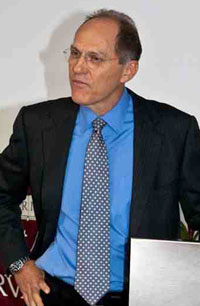 by Alexis Mordoh, Chair
by Alexis Mordoh, Chair
alexismordoh@gmail.com
The financial crisis is making everything difficult for all of us, on a personal, professional and organizational level. We are persevering, nevertheless, both with our work and with our chapter, and we believe we have created a small, but viable relational group that will grow over time. We have about twenty registered chapter members at the moment and about fifty more people directly interested in our activities.
For the academic year 2013-14, we have continued the weekly teleconferencing seminar “An Introduction to Relational Psychoanalysis and Psychotherapy”, with Jody Davies . It is based on her NYU course and provides an overview of relational theory and practice, interspersed with discussion of clinical cases presented by group members. In the near future, we will be transitioning to case presentations on a weekly basis. We are hoping that Jody will be able to come to Athens in the spring to conduct a workshop on the treatment of sexual abuse survivors.
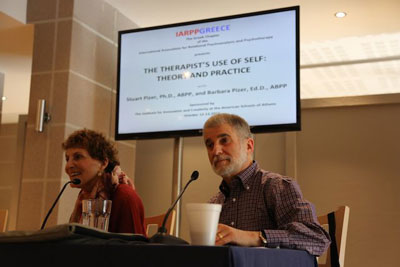
Barbara and Stuart Pizer
Last October, we had the pleasure of hosting Barbara and Stuart Pizer in Athens for a two-day workshop ,“The Therapist’s Use of Self: Theory and Practice” (see attached photos of the presenters and participants in one of the experiential exercises led by Barbara). We are planning to start a weekly teleconference seminar with the Pizers next fall, in order to introduce a new cohort to relational theory and practice.

Experiential Exercises
Finally, we have been in contact with the Israeli chapter and agreed to plan some joint educational activities in the future.
Hope to see you all soon,











